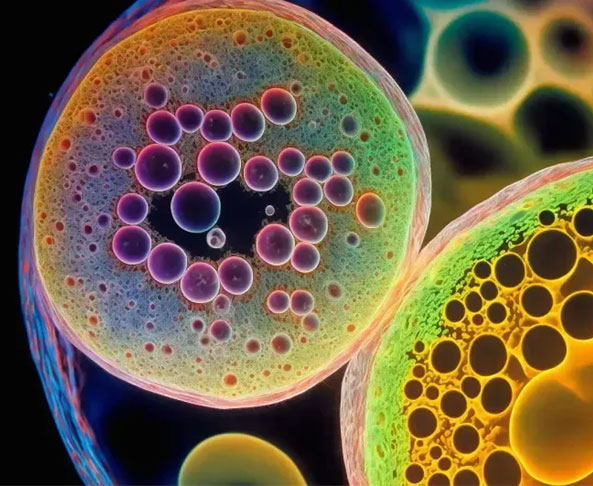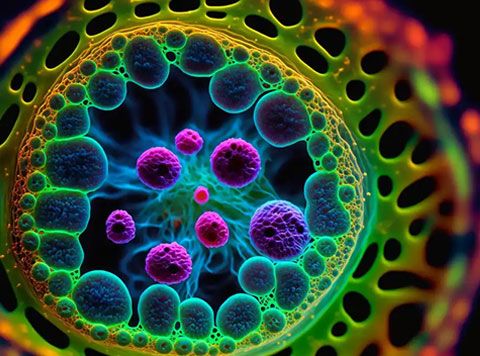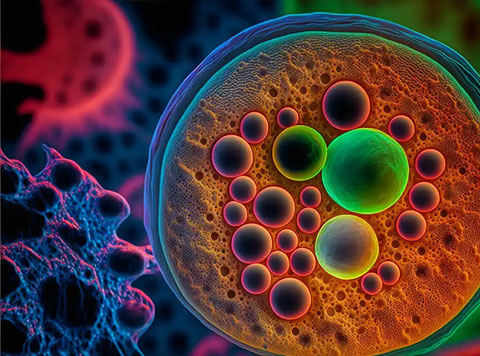Goodbye to Illness: Eastern India's First Stem Cell Breakthrough
Book an AppointmentWhat are the Stem cells called?
Mesenchymal stem cells (MSCs) are like the raw materials of our body, capable of transmuting into various types of cells with specific functions including muscle, bone, and cartilage. This therapy involves directing these cells to become specific cells within the body. These versatile cells are found in various sources, such as embryos, umbilical cords, and adult bone marrow and fat.
This is an innovative method in regenerative medicine, using the unique ability of stem cells to heal and renew different tissues in the body. MSCs are adult stem cells, conceding for their flexibility and reduced ethical considerations compared to embryonic or fetal stem cells.
Stem cell therapy holds a word in addressing a broad spectrum of medical conditions, spanning from degenerative diseases and injuries to autoimmune disorders and more.

Source: DVC Stem
What exactly is a stem cell?
It is a special kind of cell that can renew itself and change into different types of cells. These cells are present in various tissues and play a vital role in the body’s healing and rebuilding our overall body processes. For instance, in plants, certain cells in the vascular cambium direct nearby cells to become stem cells, which helps in growth.
In the medical field, stem cells offer great promise. For example, by creating insulin-secreting β-cells from human pluripotent stem cells, scientists aim to develop a diabetes treatment. Stem cells can be vulnerable to immune reactions, which can harm or kill them.
How Stem Cell Therapy Works?
Stem cell therapy is a form of regenerative medicine, used for derivatives of natural healing processes and to mend damaged, diseased, or injured tissue. This approach taps into the potential of cells rather than relying solely on organ transplants and also marks a promising advancement in medical treatment.
Stem cell therapy operates by leveraging the unique properties of stem cells, such as their ability to renew themselves, modulate the immune system, reduce inflammation, transmit signals, and transform into different cell types. Unlike embryonic stem cells, MSCs raise no ethical concerns as they are sourced from adult tissue.
What methods are used to administer stem cells?
Stem cells are administered in many ways: IV stem cell therapy (given directly into the bloodstream), directly into the spinal canal (called intrathecal administration), or through injections into specific problem areas like knees, hips, or hands.

Source: DVC Stem
IV Stem Cell Therapy
In this special technique, stem cells (MSCs), are injected directly into the patient's bloodstream. This approach will be helpful for Multiple Sclerosis (MS) because it directly targets damaged neural tissues and encourages healing.

Source: DVC Stem
Stem Cell Injections
The therapy targets utilize the regenerative abilities of stem cells to decrease inflammation, enhance the immune system, and potentially better patients' lives while slowing down disease advancement. Though further research is necessary, initial findings indicate hope for this advanced treatment in regenerative medicine.
Which diseases can be treated using stem cell therapy?
Here are various diseases that stem cell therapy has been used to treat:
- Neuro problems like Parkinson’s, Stroke, Alzheimer’s
- Heart and Blood Vessel akin Troubles: Heart Disease, Cardiomyopathy
- Liver Diseases include Cirrhosis, Liver Failure
- blood problems such as Leukemia, Lymphoma, Sickle Cell Anemia
- Type 1 & 2 Diabetes Mellitus problems
- Like COPD, Pulmonary Fibrosis breathing issues
- Joint and Bone Concerns for Arthritis, Bone Fractures
- Digestive Problems including Crohn’s, Colitis
- Related to the eye such as macular degeneration, retinitis pigmentosa etc
What benefits does stem cell therapy offer?
Mesenchymal stem cells (MSCs), a productive therapy, offer the potential for improving health outcomes across various conditions, paving the way for a healthier and brighter future.
Regenerative Power
Stem cells hold the remarkable outcomes to regenerate and repair damaged tissues, and also promote natural healing within your body.
Versatile Treatment
From injuries to chronic diseases, stem cell therapy can go to a diverse array of health concerns, offering hope where traditional treatments fall short.
Precision Medicine
For your unique needs, stem cell therapy makes distinctive treatment options that target the root cause of your condition, not just the symptoms.
Enhanced Recovery
Whether you're reviving from surgery or going through a chronic illness, stem cell therapy accelerates the healing process, getting you back on your feet faster than ever before.
Frequently Asked Questions
Well, it depends. For some folks, improvements kick in pretty quickly after treatment. But for others, it might take a bit longer to notice big benefits. It all depends on your condition, the kind of treatment you get, and other factors too.
Stem cell therapy seems hopeful for treating different health issues like bone and joint injuries, immune system problems, brain and nerve disorders, and others. Scientists are still studying how well it works for different sicknesses.
In general, stem cell therapy is seen as a safe procedure when done by trained experts in approved places. But, like any medical care, it has risks and side effects. It's important to talk about these with your healthcare professionals before getting the treatment.
Stem cell therapy is one of the most communal medical procedures where these stem cells are used to fix the damaged parts of our body. This process can change into different kinds of cells to help the body heal and grow new tissue.
